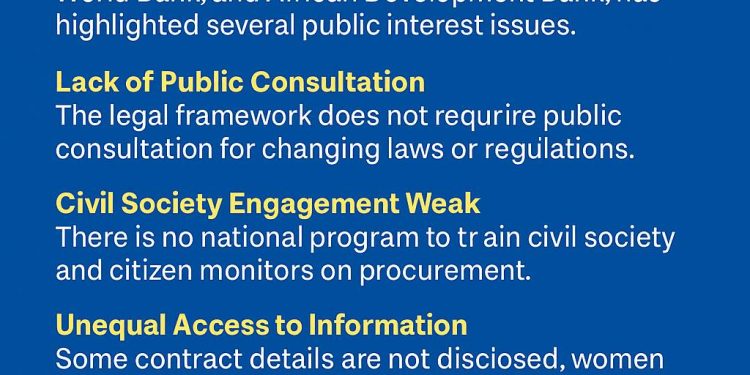Freetown, Sierra Leone, 2 August, 2025.The Government of Sierra Leone, through the National Public Procurement Authority (NPPA), has recently partnered with the World Bank and the African Development Bank to assess the state of our public procurement system using an internationally recognized diagnostic tool known as MAPS—the Methodology for Assessing Procurement Systems. While the full findings are still under internal review, there are several emerging issues that the public deserves to know, especially because public procurement affects every aspect of national development—from the roads we drive on, to the medicines in our clinics, and the quality of services delivered by government.
One of the clearest findings from the assessment is the absence of a formal requirement for public consultation when amending procurement laws or policies. Decisions affecting how taxpayer money is spent can be made without the voice of civil society, the private sector, or end users. Without structured participation, reforms may miss valuable insights and public trust in the process may be weakened.
In addition, while the NPPA has made commendable efforts to engage citizens—through media briefings, public lectures, and outreach to academia—these initiatives remain limited in scope and often rely on donor support. There is no nationwide program to consistently train journalists, civil society organizations, or community monitors to understand, follow, and interrogate procurement processes. As a result, a majority of citizens are left unaware of how procurement decisions are made or how they can play a role in ensuring accountability.
Although strides have been made in transparency—through public procurement bulletins, contract award disclosures, and the open data portal—key contract conditions and updates to procurement regulations are often not made public. Worse still, many people, especially women and rural communities, remain excluded from accessing procurement information due to digital gaps, lack of awareness, and limited data disaggregation.
Equally troubling is the fact that citizens have no formal role in any phase of the procurement cycle. From planning to contract monitoring, the public is effectively sidelined. This deprives communities of the opportunity to ensure that what was promised is actually delivered. Without community oversight, the risk of waste, abuse, or non-performance increases.
The MAPS findings also reveal weaknesses in planning and market engagement. Too often, procurement plans rely on outdated budget figures and ignore current market realities. This leads to poor value for money and undermines the quality and timeliness of public service delivery.
As NPPA continues to engage stakeholders and reflect on the MAPS findings, we remain committed to leading a reform agenda that will strengthen transparency, broaden participation, and build public confidence. We believe procurement should be people-centered—guided by inclusive processes and supported by modern tools like e-Government Procurement (e-GP).
This is not just a technical conversation. Public procurement is a matter of national interest. It affects the lives of every Sierra Leonean. That is why we are calling on civil society, the private sector, the media, academia, and everyday citizens to stay informed and ready to engage. Because when procurement works, development works—for all.
For more information, contact us at: info@nppa.gov.sl or visit our website at www.nppa.gov.sl.










